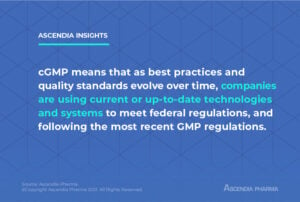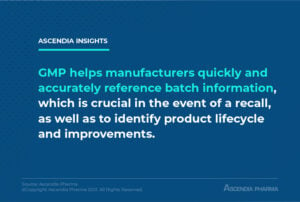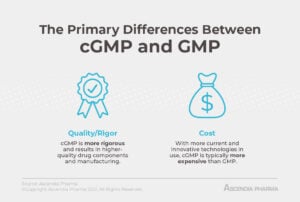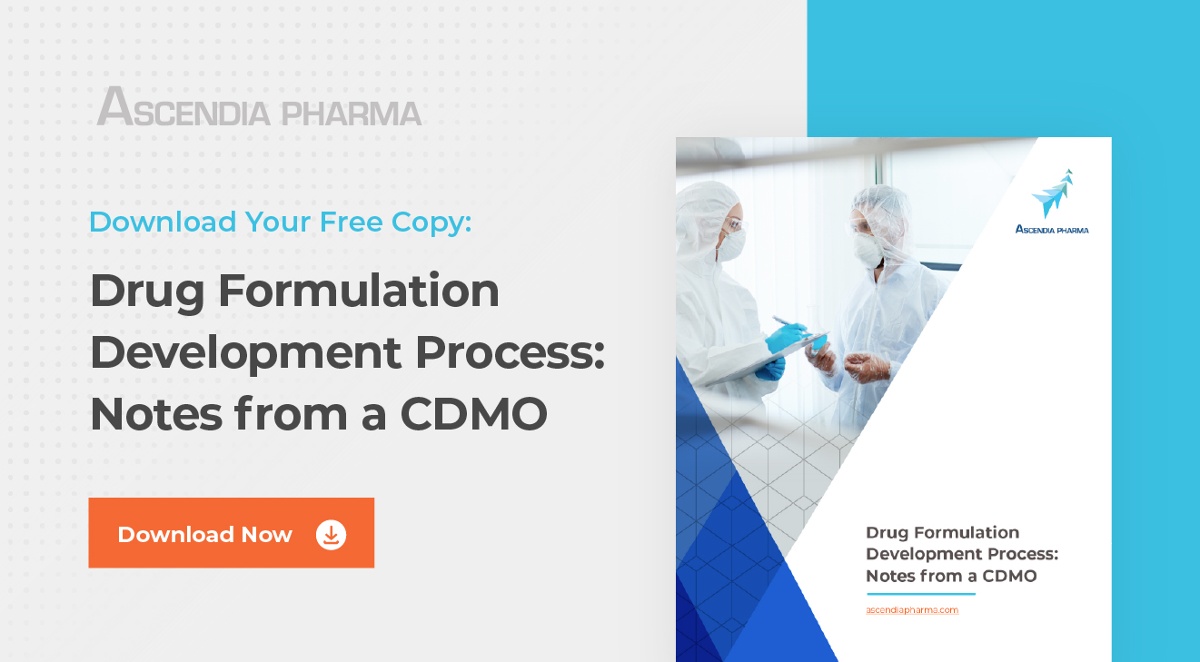cGMP vs GMP: What’s the Difference?
It’s important to understand the differences between GMP vs cGMP (Current Good Manufacturing Practices), how cGMP lays the foundation for product quality, and how it impacts new drug development and manufacturing for your pharmaceutical.
Good Manufacturing Practices (GMP) are the core regulatory standards established by the U.S. Food and Drug Administration (FDA). GMP quality standards are enforced by the FDA to ensure pharmaceutical safety and effectiveness for consumers.

What is cGMP?
cGMP ensures proper design, monitoring and control of manufacturing processes and facilities for pure and high-quality drug products.
To adhere to cGMP, pharmaceuticals and CDMOs source high-quality raw materials, use rigorous quality management systems, develop and enforce comprehensive operating procedures, have protocols in place to reveal and find the source of quality deviations, and have testing practices and laboratories in place. Through these formal practices, pharmaceuticals and CDMOs alike can reduce and avoid many mishaps that cause errors, contamination, deviations and failures.
As the name suggests, cGMP means that as best practices and quality standards evolve over time, companies are using current or up-to-date technologies and systems to meet federal regulations, and following the most recent GMP regulations.
What Does cGMP Cover?
cGMP leads to more consistent and reliable manufacturing, and higher-quality drug products, which reduces risks involved in producing (and consuming) drug products. cGMP for outsourcing facilities or CDMOs encompasses:
• Quality assurance
• Facility design
• Control systems and procedures for maintaining facilities
• Environmental and personnel monitoring
• Equipment
• Containers and closures
• Components
• Production and process controls
• Release testing
• Laboratory controls
• Stability and expiration dating (for compound drug products)
• Packaging and labels
• Reserve samples
• Compliance handling
Some examples of these cGMP include equipment and technologies that are regularly inspected, adjusted and maintained on a regular basis throughout the manufacturing process. Another aspect of cGMP is making sure documents, data and product history that is collected frequently, thoroughly documented, and stored and backed up in manner that it is secured from file corruption and security breaches and can be accessed by and shared with the proper individuals.
What is GMP?
Much like cGMP, GMP (Good Manufacturing Practices) encompasses all aspects of the drug manufacturing process to reduce cross-contamination, adulteration and mislabeling of drug products. The major difference is that cGMP is focused on continuous improvement and means the most up-to-date standards and technologies are being employed to assure quality, whereas GMP are considered a set of principles that help manufacturers develop processes to ensure quality. GMP, which are outlined by the FDA, are also considered more flexible.

What Does GMP Cover?
Most GMP requirements are very general and open-ended to give manufacturers the flexibility to determine how to implement and maintain the proper controls. GMP regulations address:
• Quality
• Sanitation, hygiene and cleanliness
• Facilities
• Equipment and technologies
• Materials
• Personnel
• Validation and qualification
• Documentation and recordkeeping
• Inspections and audits
Drug manufacturers and CDMOs who invest in and prioritize GMP standards are declaring to their customers and patients that they not only care about patient safety, but also providing high-quality pharmaceuticals when patients need them.
GMP helps manufacturers quickly and accurately reference batch information, which is crucial in the event of a recall, as well as to identify product lifecycle and improvements.

The Differences: cGMP vs GMP
While both GMP and cGMP are in place to make sure pharmaceuticals and CDMOs are producing consistent and quality drug products (and they can evolve over time to ensure the highest quality result), there are two primary differences between the two.
- Quality/Rigor — With a focus on using the most current and improved standards, cGMP is more rigorous and results in higher-quality drug components and manufacturing. Beyond the manufacturing process, cGMP also extends into intended drug use to watch and make sure pharmaceuticals are not being misused. CDMOs and drug manufacturers adhering to cGMP standards also often have a digital Quality Management System, which makes sure standard processes and approvals are followed with digital steps and signatures that cannot be skipped or tampered with.
- Cost — With more current and innovative technologies in use, cGMP is typically more expensive than GMP. More extensive and a higher quantity of testing done in cGMP also adds to the costs.
FDA Regulation
CDMOs and drug manufacturers receive frequent check-ins, in-person and virtually, as well as announced and unannounced visits to monitor adherence to the FDA’s GMP regulations. The FDA’s cGMP sets minimum standards for the methods, facilities and controls in use for manufacturing, processing and packaging drug products. All of these regulations ensure the product works as it should and is safe for patients to use.
When cGMP is not followed, the FDA can urge the manufacturer to recall its product, or a new drug product that is in development may not receive FDA approval if cGMP regulations are not followed during its development and manufacturing.
Why GMP and cGMP Are Important When Choosing a CDMO
The importance of cGMP vs GMP boils down to patient safety and the effectiveness of the drug product.
The FDA’s rigorous regulations were developed to ensure only safe and effective treatments are tested in clinical trials. Complying with those regulations requires expertise, experience and resources that may make outsourcing to a CDMO more ideal than keeping it in house.
Ascendia offers cGMP manufacturing services for Phase 1 and Phase 2 clinical studies. The New Brunswick, NJ, facility has Class 10,000 (ISO 7) and Class 100 (ISO 5) cleanrooms for conducting cGMP manufacture of sterile injectable products.
Ascendia Pharmaceuticals — a leader among CDMO companies in delivering rapid, comprehensive, and cost-effective solutions for difficult formulation development projects — provides cGMP manufacture of clinical trial materials. Learn about our manufacturing facility and equipment here, and contact us today to inquire about a CDMO partnership.

